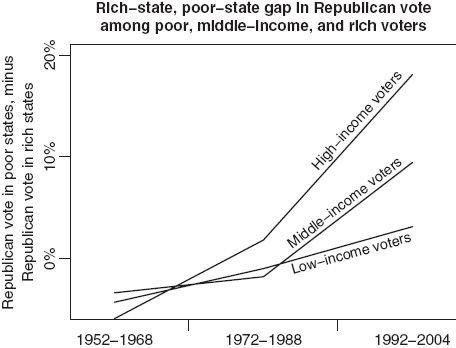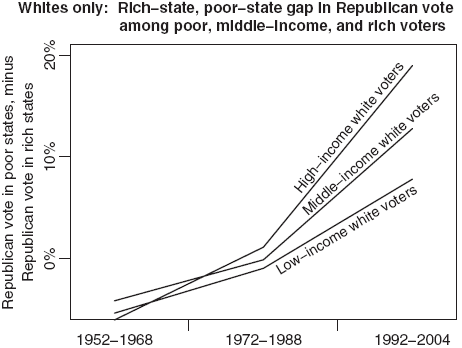A couple weeks ago I posted an analysis of rich and poor voters in rich and poor states from exit polls in 2008, and a commenter (“Audacious Epigone”) picked up on Larry Bartels’s observation that, among whites, the Republican advantage among richer voters compared to poorer voters is not larger in poor than in rich states. As “Audacious” writes:
I’m skeptical about the claim that in ’00 and ’04, whites followed the larger PMD trend that he says did not persist in ’08. As you’ve pointed out elsewhere, state voting patterns changed little between the ’04 and ’08 elections. Some realignment of the white vote did occur, though. For the claim to hold, this would have to have consisted of poor whites in the McCain belt turning sharply more Republican than they already had been, and wealthy whites on the West Coast and Northeast becoming more Democratic than they had previously been.
My reply: I seem to recall that the difference between rich and poor states in their rich-voter-poor-voter patterns was stronger in 2000 than 2004. We did some analysis restricting to whites (and also restricting to 25-65-year-olds, I think) and still found interactions between individual and state incomes when predicting votes. The differences among whites alone were about half of what you get looking at all voters. Here’s a quick summary (from chapter 9 of Red State, Blue State):


So, yes, the difference in how rich whites and poor whites have voted has been larger in poor states than in rich states, at least in the 1992-2004 period.
Beyond this, I wanted to emphasize a point that I think we mentioned in the book also, which is that, even if certain differences were entirely “explainable” by race–meaning that these patterns occur in the whole population but not when considering whites, blacks, and others separately–this doesn’t mean these differences aren’t real. As we know from studying public opinion and voting, economic issues are huge, and the correlation between economics and ethnicity (in the U.S. and in many other places) doesn’t mean that economics doesn’t matter. When trying to understand the differences between Democrats and Republicans on economic issues, I think it can be helpful to understand the economic positions of their voters–conditional on race and also in aggregate. Both analyses are relevant.
As a side note, from a political perspective I find it interesting that people on the left and the right are particularly interested in racial angles on voting. From the left, I often see the claim that differences between northern and southern whites (for example) are a product of their different perspectives on race. From the right, I often see the desire to compare whites to whites (for example, when comparing the U.S. to Europe, as at the end of Audacious’s blog entry linked to above). Both the left and right have good points here–I’m certainly not trying to place myself as a centrist who’s above it all–but it’s just interesting to me to see that race has a higher profile on the ends of the political spectrum than in the middle.
Professor Gelman,
Thank you for the prompt and informative response.
I should be careful not to insinuate that just because the economic divide is largely a racial divide (in '08, anyway) the former is somehow of no importance. But the status competition among whites (in the US and in Europe) is of enormous importance, and failing to take race into account often obscures what's going on in the white v. white arena.
I'm embarrassed to say I've not yet read RSPSRSBS (I put it on the Christmas list instead, so it's on the way!), but I presume r-values are given to complement the well-regarded and copious graphs.
Also, I don't suppose there is a public database with voter patterns broken down by both race and income for the 2004 Presidential election and before, then?